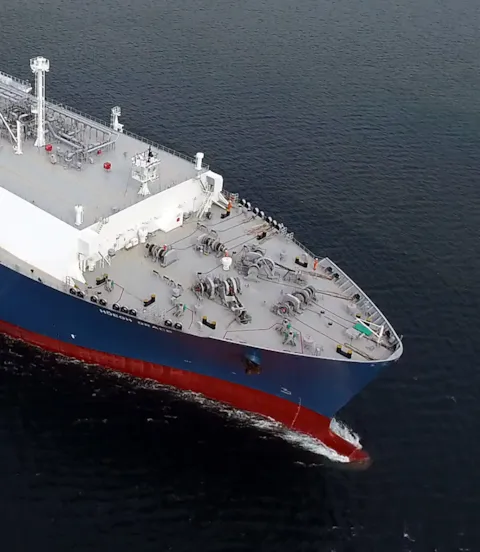Ask the FSRU experts
Over the past ten years LNG has become a popular form of transporting energy over large distances. DNV GL’s advisory services help owners and charterers of floating regasification units assure the safety, functional integrity and economic value of these complex units.
The availability of liquefied natural gas (LNG) in large quantities in the world market is providing many coastal nations with access to a new, low-pollution energy source. Forming the interface between LNG carriers and the local gas supply infrastructure, floating storage and regasification units (FSRUs) play a key role in the LNG value chain, and not surprisingly demand for these units remains strong. Compared to land-based regasification plants they offer numerous advantages, including faster planning, construction and deployment, flexible redeployment, independence from space availability on land and the associated permitting procedures, and significantly lower cost. In addition, FSRUs promise independence from international pipelines and are less likely to meet with popular opposition or be subject to bureaucratic delays.
By providing three separate LNG-related functions – transport, storage and regasification – FSRUs offer exceptional versatility and convenience. However, to allow owners and their customers to reap the full benefits of this potential, FSRUs must be designed with enough flexibility in mind so they can be used in a variety of situations throughout their operating life. Furthermore, the physical properties of LNG require highly specialized handling and storage equipment which is subject to stringent quality and safety standards. Today’s owners and operators know that understanding the complexities and system interdependencies on board a regasification unit is a gigantic task. From the planning and design stage through to the asset’s end of life there are countless questions to be answered that require very specialized knowledge. Working with a competent partner is a must.

Going the extra mile
Based on its many years of experience and its pioneering role in the FSRU segment, DNV GL is in a unique position to help planners, designers, builders, owners and operators of FSRUs ensure efficient construction and operation while adhering to the highest safety standards. Having been involved in the development of FSRUs from the very beginning, DNV GL offers a comprehensive range of class-independent advisory services for FSRU projects, supporting owners in defining the boundary conditions for FSRU designs, ensuring fast approval of modifications when customizing existing vessels, and providing decision support and requirement-based evaluations that go beyond the ship itself and can include items such as tendering, cybersecurity, shore facilities, and project due diligence as well.

Services based on real-life experience
Conversion of existing LNG carriers is a common way of making FSRUs available to the market relatively quickly. In such a case a thorough assessment of the vessel before conversion is essential for the success of the project. In particular, the LNG cargo tank system must be examined for its remaining operable life, and all processing equipment, pipelines and connection points on board must be scrutinized for fatigue and crack propagation to determine how long the ship can serve its new purpose safely and to find out if and where steel repairs or renewals are required. For conversion projects it might be beneficial to increase the maximum tank vapour pressure beyond the 0.25 bar normal for LNGCs. Experience indicates that such vessels may sustain pressures up to 0.4 bar or even above when operated in calm waters.
As for newbuilding projects, there are many questions that must be answered by the different stakeholders before a new FSRU can be ordered and built, from feasibility and risk assessments to specification reviews, the unit capability definition and the design review, through to support in charterer negotiations and contracting. Since the world’s first-ever FSRU was commissioned about ten years ago, DNV GL has assisted in numerous projects. Backed by this practical experience and its profound knowledge of applicable rules and regulations, DNV GL is able to provide guidance before, during and after conversion or newbuilding.
For example, a major FSRU operator needed to map and assess the complex energy flows on board these units to identify the best new technology options for next-generation designs. DNV GL used its COSSMOS modelling service to examine the integrated power generation and processing plant design, simulate operation, and define operational profiles and the required metrics to provide decision support for the future operator. In the process, the intricate interaction patterns between the subsystems were studied, and critical areas for process improvement were identified. DNV GL developed, proposed and evaluated various alternative system configurations so the customer could select the best-performing variant.
In another project, an existing Moss-type LNG vessel was to be converted into an offshore FSRU, and DNV GL was asked to assess the feasibility of extending the operating life of the cargo tank system for this purpose. In particular, the owner needed a thorough fatigue and crack propagation analysis. Based on its long experience with Moss-type LNG tanks and knowledge of the relevant rules and regulations, DNV GL scrutinized the tanks, in particular the critical tower-to-tank shell connections, which are prone to fatigue. The remaining fatigue life and crack propagation rates were calculated to establish leak-before-failure criteria, and the customer received a comprehensive assessment and well-founded advice as a basis for its decision-making process.

Full lifecycle support
When a shipping company serving the oil and gas industry asked DNV GL for help developing a well-structured energy management approach that would support the company’s cost containment strategy, DNV GL formulated an energy strategy, defined appropriate organizational roles and processes interfacing with the company’s existing processes, and prepared a reporting and monitoring concept. The DNV GL experts also performed quantitative analyses of operational profiles and fleet performance along with a cost – benefit assessment, and defined implementation-ready on-board energy-saving measures.
As these examples show, DNV GL’s advisory services cover a wide range of LNG and FSRU competence and service areas, providing valuable decision support, helping avoid management mistakes, and improving safety, energy efficiency and ultimately, financial performance and corporate value.

Shinta Yosephine Rotty
Principal Consultant